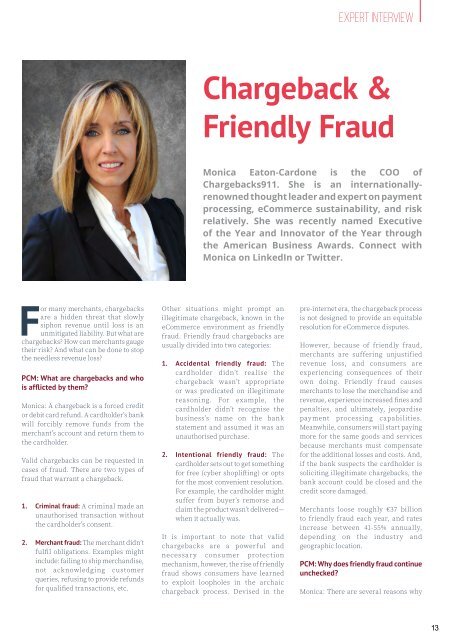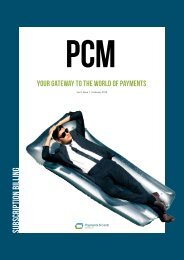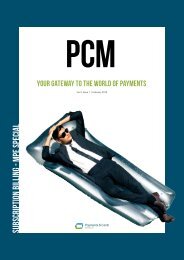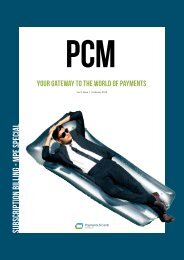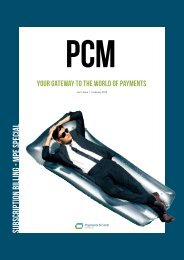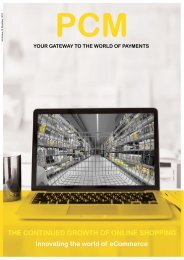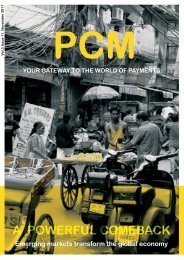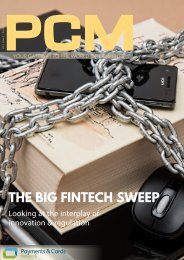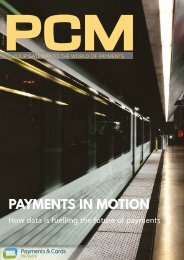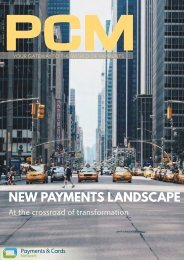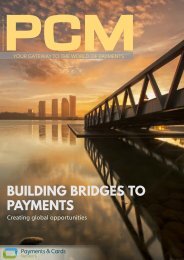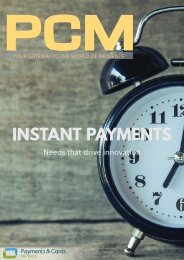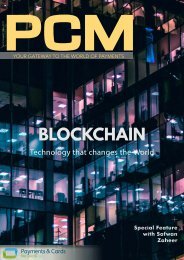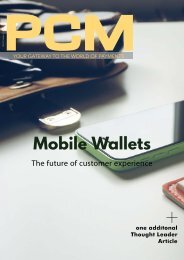PCM vol. 3 issue 2
The February issue of the Payments & Cards eMagazine "PCM" - In this issue we talk about all things Risk & Fraud in the Payments, FinTech and eCommerce space. Contributions from Risk Ident, Chargebacks911, 4Stop and Trulioo.
The February issue of the Payments & Cards eMagazine "PCM" - In this issue we talk about all things Risk & Fraud in the Payments, FinTech and eCommerce space. Contributions from Risk Ident, Chargebacks911, 4Stop and Trulioo.
Create successful ePaper yourself
Turn your PDF publications into a flip-book with our unique Google optimized e-Paper software.
expert interview<br />
Chargeback &<br />
Friendly Fraud<br />
Monica Eaton-Cardone is the COO of<br />
Chargebacks911. She is an internationallyrenowned<br />
thought leader and expert on payment<br />
processing, eCommerce sustainability, and risk<br />
relatively. She was recently named Executive<br />
of the Year and Innovator of the Year through<br />
the American Business Awards. Connect with<br />
Monica on LinkedIn or Twitter.<br />
For many merchants, chargebacks<br />
are a hidden threat that slowly<br />
siphon revenue until loss is an<br />
unmitigated liability. But what are<br />
chargebacks? How can merchants gauge<br />
their risk? And what can be done to stop<br />
the needless revenue loss?<br />
<strong>PCM</strong>: What are chargebacks and who<br />
is afflicted by them?<br />
Monica: A chargeback is a forced credit<br />
or debit card refund. A cardholder’s bank<br />
will forcibly remove funds from the<br />
merchant’s account and return them to<br />
the cardholder.<br />
Valid chargebacks can be requested in<br />
cases of fraud. There are two types of<br />
fraud that warrant a chargeback.<br />
1. Criminal fraud: A criminal made an<br />
unauthorised transaction without<br />
the cardholder’s consent.<br />
2. Merchant fraud: The merchant didn’t<br />
fulfil obligations. Examples might<br />
include: failing to ship merchandise,<br />
not acknowledging customer<br />
queries, refusing to provide refunds<br />
for qualified transactions, etc.<br />
Other situations might prompt an<br />
illegitimate chargeback, known in the<br />
eCommerce environment as friendly<br />
fraud. Friendly fraud chargebacks are<br />
usually divided into two categories:<br />
1. Accidental friendly fraud: The<br />
cardholder didn’t realise the<br />
chargeback wasn’t appropriate<br />
or was predicated on illegitimate<br />
reasoning. For example, the<br />
cardholder didn’t recognise the<br />
business’s name on the bank<br />
statement and assumed it was an<br />
unauthorised purchase.<br />
2. Intentional friendly fraud: The<br />
cardholder sets out to get something<br />
for free (cyber shoplifting) or opts<br />
for the most convenient resolution.<br />
For example, the cardholder might<br />
suffer from buyer’s remorse and<br />
claim the product wasn’t delivered—<br />
when it actually was.<br />
It is important to note that valid<br />
chargebacks are a powerful and<br />
necessary consumer protection<br />
mechanism, however, the rise of friendly<br />
fraud shows consumers have learned<br />
to exploit loopholes in the archaic<br />
chargeback process. Devised in the<br />
pre-internet era, the chargeback process<br />
is not designed to provide an equitable<br />
resolution for eCommerce disputes.<br />
However, because of friendly fraud,<br />
merchants are suffering unjustified<br />
revenue loss, and consumers are<br />
experiencing consequences of their<br />
own doing. Friendly fraud causes<br />
merchants to lose the merchandise and<br />
revenue, experience increased fines and<br />
penalties, and ultimately, jeopardise<br />
payment processing capabilities.<br />
Meanwhile, consumers will start paying<br />
more for the same goods and services<br />
because merchants must compensate<br />
for the additional losses and costs. And,<br />
if the bank suspects the cardholder is<br />
soliciting illegitimate chargebacks, the<br />
bank account could be closed and the<br />
credit score damaged.<br />
Merchants loose roughly €37 billion<br />
to friendly fraud each year, and rates<br />
increase between 41-55% annually,<br />
depending on the industry and<br />
geographic location.<br />
<strong>PCM</strong>: Why does friendly fraud continue<br />
unchecked?<br />
Monica: There are several reasons why<br />
13


